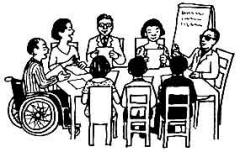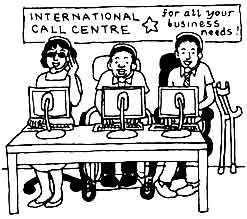Your progress
0%
The activities below represent some strategies your organization can use to support people with disabilities who wish to pursue wage employment.
Use your mouse or keyboard to expand each of the activity headings below. To add an activity to your action plan, select the Add button beside it.

Raising awareness about the potential and rights of workers with disabilities is an important activity in enabling people with disabilities to find wage employment. Targets for these activities include:
The involvement of government officials is very helpful in such activities.
Learn about the efforts an organization of employers in Barbados is making to promote the hiring of people with disabilities.


Srini works for one of the largest IT companies in India, Wipro, which employs 44,000 people. Srini, who has cerebral palsy, has achieved his current position through a combination of his own determination and the support provided by his parents. From infancy, Srini’s mother and father were determined that he should be given the best possible chance in life and his upbringing became a remarkable joint project between them, Srini and others who believed in him.
When Srini was 12, his father bought him a typewriter and he soon mastered its keyboard and wrote his school assignments on it. On completion of his schooling, he went on a six-month computer training course, where he learnt basic computer skills. He then began to work as a volunteer at the Spastics Society, teaching other pupils to use a computer. Then came his lucky break. The Vice-President of Wipro visited the Society, observed Srini at work and offered him a job.
Srini has now worked for the company for seven years. His work is in administration and involves arranging conference facilities and meetings, data inputting and other tasks on the computer. Although Srini has a speech impairment, he communicates effectively with colleagues, mainly through e-mail.
Understand the policy environment
Before beginning any awareness campaign, it is important for CBR to have an understanding of the legal and policy issues related to the employment of people with disabilities and the obligations of employers, in the local context.
CBR can work with people with disabilities and their organizations to become familiar with the national and local employment policies, and to advocate for policies where none exist. It is also important that employers understand the legal and policy framework.
Identify the most effective strategy for raising awareness
Strategies for an awareness campaign include:
Make the business case
What are the advantages to employers of hiring workers with disabilities?
Provide links to referral and support services
CBR needs to have up-to-date information on services that can support people with disabilities in finding wage employment. Such services include:
CBR can then link job seekers with disabilities to these services or, where they do not exist, can consider providing them.
Survey the labour market
Accurate and up-to-date information on the local labour market is needed to support people with disabilities to find employment. Some of this information may be already available from sources such as the local chamber of commerce or a relevant government authority like the ministry of labor. Employment opportunities can also be identified through simple research, by contacting enterprises directly to assess their needs and demands for workers, as well as the supply of workers available to fill available jobs.
Assess and support people with disabilities seeking employment
Before an individual with a disability begins looking for work, it is important to identify what he or she wants to do. CBR personnel can help job seekers assess their interests and goals, skills, talents, motivation and forms of support. This can be done by talking with them to determine their education, training and work history, day-to-day activities, goals and aspirations.
Help to match the person to the job
In job seeking, a vital part of supporting people with disabilities to find a job is to make a good match between their skills, talents, and potential support needs in the workplace and the requirements of the job.
To find a good match, it may be necessary to carry out a job or work analysis, which involves analysing an existing job to assess:
Assess the potential support needs
It is important to understand how a person’s disabilities may impact him or her in the workplace. This can be done by asking the person with disabilities directly about his or her needs. Observing the individual in work or daily living activities can also be useful.
From this information, the required support or adaptations the person may need in the work environment can be identified. These might include:
Provide training to develop job-seeking skills
Many job seekers with disabilities are able to look for their own jobs. However, some can benefit from training to help them develop job-seeking skills, for example on how to:
It is sometimes also useful to provide job seekers with access to the facilities they will need to look for employment such as telephones, computers and desks.
Learn how a Business Advisory Council is working to match job seekers with employment opportunities in Cambodia.


The Business Advisory Council (BAC) in Cambodia is a voluntary group of business leaders who work together to promote employment for people with disabilities.
One of BAC’s activities is to identify job vacancies through its members and then linking these with a national non-governmental organization, the National Centre for People with Disabilities, to identify job seekers with disabilities to match the vacancies.
Use existing support networks
For some people with disabilities, their family or other social networks may be able to provide assistance and support in finding and maintaining wage employment.
The person with a disability can also their networks to get more practical types of help, such as finding a lift to work with a neighbour, or seeking job leads and job information through friends and family who are working
Ensure ongoing support through job coaches, business mentors and/or partners
Once a worker with disabilities is employed, CBR can ensure the availability of a support worker, job coach, staff member, union volunteer or mentor to provide ongoing support to:
See how ongoing support helped a young man with cerebral palsy achieve success in the computer industry in India.


Srini works for one of the largest IT companies in India, Wipro, which employs 44,000 people. Srini, who has cerebral palsy, has achieved his current position through a combination of his own determination and the support provided by his parents. From infancy, Srini’s mother and father were determined that he should be given the best possible chance in life and his upbringing became a remarkable joint project between them, Srini and others who believed in him.
When Srini was 12, his father bought him a typewriter and he soon mastered its keyboard and wrote his school assignments on it. On completion of his schooling, he went on a six-month computer training course, where he learnt basic computer skills. He then began to work as a volunteer at the Spastics Society, teaching other pupils to use a computer. Then came his lucky break. The Vice-President of Wipro visited the Society, observed Srini at work and offered him a job.
Srini has now worked for the company for seven years. His work is in administration and involves arranging conference facilities and meetings, data inputting and other tasks on the computer. Although Srini has a speech impairment, he communicates effectively with colleagues, mainly through e-mail.
When assisting people with disabilities in finding work, CBR does not need to work alone. In many countries, there may be government agencies, NGOs and professional bodies, especially associations of occupational therapists, which can help.
Encourage employers’ organizations to recruit people with disabilities

Employers’ organizations, such as chambers of commerce, Rotary clubs, training centres, alumni associations and other such groups, can provide useful information about:
CBR , together with DPOs, can plan publicity drives to encourage employers of all sizes to consider employing people with disabilities. An important part of such efforts is explaining the reasons why hiring people with disabilities is beneficial, using the business case presented above and examples from local communities.
Build partnerships with trade unions and workers’ organizations
CBR programmes can also build partnerships with trade unions and workers’ organizations. Because of their commitment to equality, solidarity and social justice, these bodies are in a unique position to promote and facilitate equal opportunities and treatment of workers with disabilities. Trade unions can:
Encourage employment of people with disabilities in non-governmental organizations
Organizations, especially those engaged in disability, rehabilitation or development, need to be proactive in employing people with disabilities or their family members.
Learn about a group of business people who came together in Sri Lanka to respond to the barriers faced by people with disabilities.


The Employers’ Federation of Ceylon has developed the Sri Lanka Employers’ Network on Disability, in which a group of business people came together to respond to the barriers faced by people with disabilities. They linked up with Motivation, an international non-governmental organization, to run several joint job fairs for job seekers with disabilities.
Motivation screens participants according to employer needs and enables them to market themselves through job-seeking skills training and to represent themselves at job fairs. The network has engaged in many other activities, sometimes on its own, sometimes with support from government and non-governmental organizations. These include: